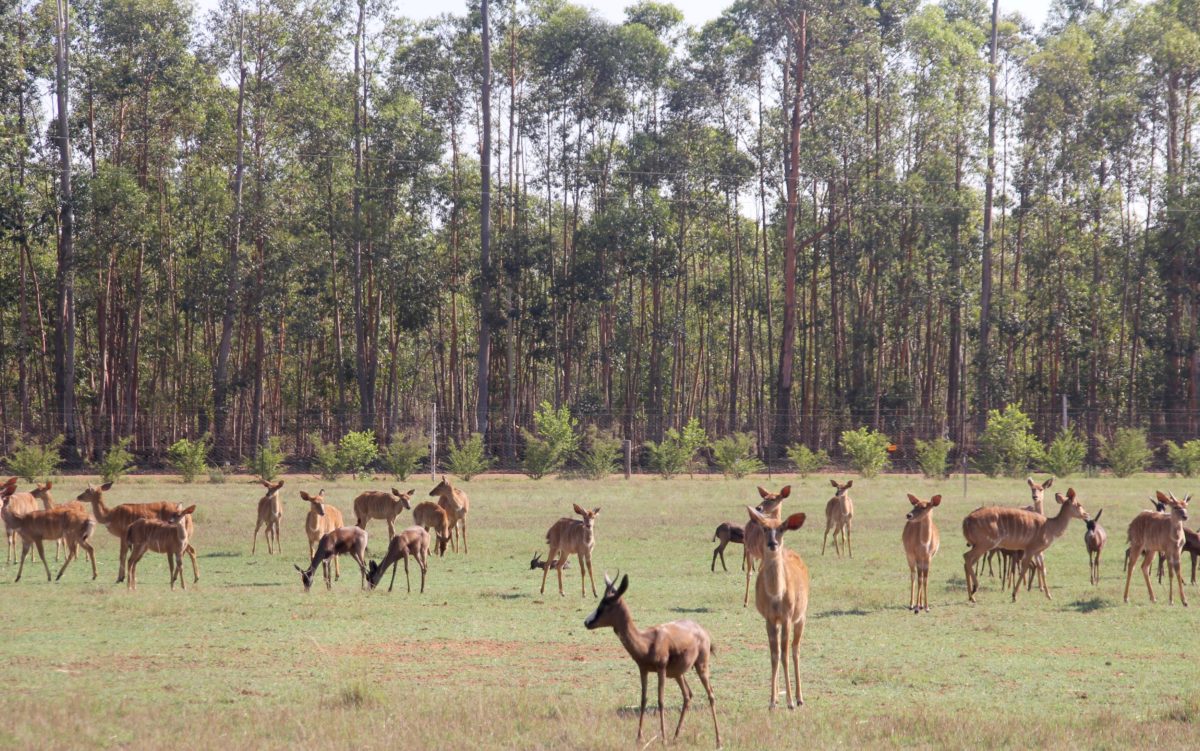As Roy and I prepared to head off to Modimolle in Limpopo Province (previously Nylstroom in the Northern Transvaal) for Mathilda and Leon’s hugely enjoyable wedding a few weeks ago, I found myself questioning my cultural identity as an “English” South African. What does that strange expression even mean?
For white, English-speaking Durbanites, an invisible yet undeniable divide lies to the west of us – somewhere between 100 and 200 kilometres, I reckon – that separates us from the mainly Afrikaner hinterland. Julie Simpson calls it “the boerewors curtain”. (That’s why the Limpopo game-farm buck in the photo look so nervous; they know they’re only a stage away from biltong.)
Every Christmas and Easter holiday when I was a child, thousands of Afrikaner families made the Groot Trek to Natal’s eastern seaboard, to the Indian Ocean and our gorgeous beaches. (They still do, now joined by even more thousands of black families in a slightly more egalitarian post-apartheid era.) That spirit is best summed up by this verse of the classic “Ag, Pleeze Deddy”, first recorded by Jeremy Taylor in 1961:
Ag pleez Deddy won’t you take us off to Durban
It’s only eight hours in the Chevro-lay
There’s spans of sea an’ sand an’ sun
And fish in the aquari-yum
That’s a lekker place for a holi-day
Chorus:
Popcorn, chewing gum, peanuts an’ bubble gum
Ice cream, candy floss an’ Eskimo Pie
Ag Deddy how we miss
Nigger balls an’ licorice
Pepsi Cola, ginger beer
and Canada Dry
We’ve Been Lucky
One of the many great things about living in Singapore was the opportunity to meet some outstanding Afrikaners who are now some of our closest friends – among them Sue, Malinda and Mathilda, veteran expats and global citizens whom we’d never have met if we’d stayed put in Durban for the rest of our lives.

Mathilda and Leon’s Wedding
Conflicted Identity?
As children, my friends and I – weirdly, but just like all other English-speaking, white South Africans – identified ourselves as being “English”, rather than “Afrikaans”. Only much later, when I went overseas in my early twenties, would I learn to describe myself as an English-speaking South African, as opposed to other white South Africans who spoke Afrikaans at home. (I also learnt to say “traffic lights” instead of “robots”.)
Durban has always been a peculiarly English-speaking corner of the country. But in fact I’m a real mongrel: Dutch, Danish and French (Huguenot) on my dad’s side; more Dutch, English, Irish and Scottish on my mother’s. When you add it all up, there’s more Dutch in me than anything else – 50 percent, I reckon.

My paternal grandfather was a KwaZulu-Natal South Coast teacher and headmaster named Machiel Dawid Maree – his surname, which I share, is from the French marée meaning “tide”. He married a brown-haired, dark-eyed Danish woman named Maren Jorgensen (Maren is my middle name), who spoke only English to her four children; my dad was christened the anglicised version of his dad’s name, Michael David Maree.
Dad’s brothers married Afrikaans women and set up house in the typically Afrikaans provinces of the (then) Free State and Transvaal, where there they raised my cousins as Afrikaners. He, on the other hand, married my solely English-speaking, Anglophilic mother, née Sheila Mary Painter, and Dale and I grew up “English”.
More’s the pity, especially as my maternal granny was one Christina Louwrens, who grew up as the youngest of a big, staunchly Calvinistic family on a farm near Ermelo in what used to be called the Eastern Transvaal. (For a photograph of my mother’s youthful parents, flip back to my 8 November blog.)
What’s Wrong with Us?
Though I love the lyricism and unique expressiveness of the Afrikaans language, I’m sad to admit that I don’t speak it fluently. That’s because Durban was so Anglo-centric that it used to be referred to as “the last outpost of the British Empire”; and because the rare Afrikaners you met socially would courteously switch to English whenever you joined their company.
At Durban Girls’ High School, my school friends seemed to pride themselves on their poor Afrikaans results. My stepchildren were the same in the 1990s. Even now, 20 years later, my friends’ children do well in every subject except Afrikaans; it’s almost a badge of honour.
I think that’s a shame. Compared to many other tongues – and especially English – Afrikaans is not difficult to learn; and neither is it simply the defunct language of the colonial oppressor. It still remains the home language of seven million (or 13.5 percent) of the South African population, the vast majority of whom are black or so-called coloured. What’s more, knowing Afrikaans makes it super-easy to learn Dutch, and even gives you a bit of a head-start with German and other Teutonic languages.
Now I’ve got that off my chest, dankie en totsiens until next time.













